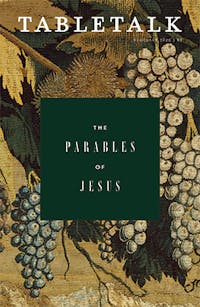
Request your free, three-month trial to Tabletalk magazine. You’ll receive the print issue monthly and gain immediate digital access to decades of archives. This trial is risk-free. No credit card required.
Try Tabletalk NowAlready receive Tabletalk magazine every month?
Verify your email address to gain unlimited access.
On the face of it, the parable of the persistent widow (Luke 18:1–8) strikes us as odd, and not a few pastors and laypeople struggle to grasp it. But the parable, once understood in its context, makes marvelous sense and urges God’s people to press on in the faith.
Contextually, we are near the end of the long journey to Jerusalem, a trek that occupies nearly a third of Luke’s gospel (9:51–19:44). The parable comes on the heels of Jesus’ discourse on His return as the Son of Man, an event that will occur at the very end of history (17:20–37). During the period between Christ’s first and second comings, the covenant community will endure great hardship and persecution, so the parable motivates believers to persevere. Unlike other parables in Luke’s gospel, the parable of the persistent widow is prefaced with a purpose statement: “that they [the disciples] ought always to pray and not lose heart” (18:1; see 5:36; 6:39; 12:16; 13:6). The phrase “lose heart” occurs often in the New Testament in the context of bearing up under end-times persecution. For example, Paul tells the Ephesian church “not to lose heart over what I am suffering for you, which is your glory” (3:13; see also 2 Cor. 4:1, 16; Gal. 6:9; 2 Thess. 3:13).
The general flow of the parable is easy enough: a widow steadfastly pleads with a pagan judge to grant her justice. Nearly all details of the parable are vague—we know nothing of why or how the widow was wronged, nothing about the “adversary,” and nothing about where this took place except for “in a certain town” (Luke 18:2). But we do learn something about the nature of the judge. He “neither feared God nor respected man” (v. 2) and, because of the widow’s persistence, he handed down a favorable verdict (v. 5).
The parable turns on two key themes: justice and perseverance. Luke goes out of his way to highlight the unbelieving status of the judge. Why? The idea is that if an unrighteous judge hands down a favorable verdict for persistence, how much more will a righteous judge do so? The noun and verb forms for “justice” are found throughout the parable, occurring in verses 3, 5, 7, and 8. This is not the generic form for “justice,” though. The term here is found in a number of passages that describe acts of retribution or vengeance—justice for a person who has been victimized. For example, in Acts 7:24, Stephen recounts an event from the life of Moses: “Seeing one of them being wronged, [Moses] defended the oppressed man and avenged him by striking down the Egyptian” (see Ex. 2:11–12). The words here for “wronged” and “avenged” are derived from the same ones we find in Luke 18:3 (see also Rom. 12:19; 13:4; Heb. 10:30; 1 Peter 2:14; Rev. 6:10). The widow in the parable, then, is seeking retribution and vindication. She desires that the judge punish the one who has unjustly wronged her.

We would do well to consider how this parable fits into the wider context of Luke 17–18. In the preceding passages, much of what Jesus teaches concerns the believers’ perseverance before His second coming (17:22–37). As history unfolds, hostility increases between God’s people and the world. We live in the “latter days,” a period of time that is oddly marked by the presence of the kingdom of God and the tribulation (Matt. 13:24–50). Participating in the kingdom inevitably results in great hardship and persecution. True believers must be willing to lose their lives for the sake of the kingdom (Luke 17:33). They will be wronged, and the world will do its worst. But, because the widow persevered, the judge avenged her. Because true believers press on in faith, God promises to avenge them. Faith is indeed a gift of God, an act of pure grace (Eph. 2:8–9), but true faith is always accompanied by faithful works (James 2:14–26). Perhaps one of the closest passages to the parable of the persistent widow is the fifth seal in Revelation 6:10, where the deceased saints in heaven cry out to God, “O Sovereign Lord, holy and true, how long before you will judge and avenge our blood on those who dwell on the earth?” As we yearn with the heavenly saints for God to pour out His justice on the world, He reminds us of one thing: “Wait a little longer” (v. 11).
